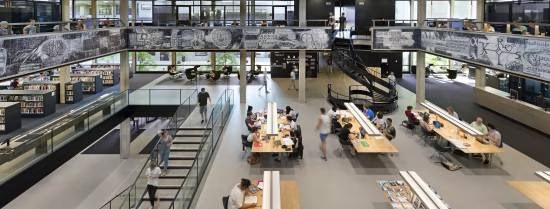Though academics are facing enormous amounts of workload, many prove reluctant to ask for help. If it were up to the university’s library-director Matthijs van Otegem, that culture will soon change. A pilot between Erasmus University and Peerwith, a peer-2-peer marketplace for academics, should allow authors to acquire services from people they trust, and can deliberate with.
Have you ever had that feeling that an editor just ripped your text of its soul, or that an illustrator has missed an ever important detail? Like artists, researchers often have a deep passion for their topic, and it is very important to them that their scientific results are published the way they envisioned them. Keeping that in mind, it is perhaps not so surprising that most academics told Matthijs they are really not interested in a platform like Peerwith, where they can hire the services of editors, illustrators, translators or statisticians - outsiders offering to intervene in their precious works.
Transparency
However, in sharp contrast with the love for their research work, many dread the process of shaping a draft of an article into a publication-ready version. The hassle of getting a native speaker to check the text, getting the right visual at the right page and revisiting every piece of your data set – all of that may delay the process for months, draining energy as it goes. At the moment, such services are often mediated by publishing houses, leaving the author with little more than an anonymous bill, no clue as to who has touched your text and no opportunity to discuss the options.
‘That may work well when translating the manual of a vacuum-cleaner,’ Matthijs argues, ‘but an academic text usually needs many more rounds of discussion.’ After all, a slight change in vocabulary may have a huge impact on the study as a whole, or the way it will be used and interpreted. Engaging with an unpublished academic text requires trust and understanding. Hence, Peerwith offers an environment where you can see who you are dealing with, what they have done before and how others value their services.
Crusade for quality
Scientists often feel they should be able to do anything: not only do the research, but also speak English like a native and run statistics like a statistician, Matthijs notices. There seems to be a taboo on not being Superman, on not being able to do just about anything. ‘Even if they acknowledge they can use some help, they end up asking their neighbour who happened to have lived in the UK for a few years. It would be good if we can professionalise these services, so authors can turn in better manuscripts.’
Real warriors do not back down easily, and neither will Matthijs. Despite the disheartening results of the initial questionnaire, suggesting that no academic would ever be interested in using Peerwith, he perseveres - running a pilot that will introduce Erasmus academics with Peerwith services. To make it easier to use Peerwith, its platform will also be used to access free services the library already provides, like getting advice on authorship contracts and supporting open access. By offering a dedicated Erasmus-section on the Peerwith platform, focusing on a few research groups to start with, the partners hope to acquire enough knowledge with which to expand the service to the entire university.
PeerScienceCoin
During the pilot period, money should not be what stops academics from using Peerwith-services, the director decided. ‘Producing the department with a bill for such services may feel like you are admitting to failure,’ he realises, ‘and researchers are easily put off by financial administration.’ This is why the financial dimension of it is managed by the library.
In the future, a ‘PeerScienceCoin’ (PSC) can facilitate this: a blockchain-based service connected to the platform. The coin allows universities to easily fix a budget for their researchers, enabling them to manage microprojects and micropayments with reduced transaction costs and no minimum fee. The PSC will also remove issues surrounding payments made in foreign currencies. ‘What matters most though, is providing a service that really meets the needs of our researchers,’ Matthijs believes. ’If we meet this challenge accordingly, this will be a standard service by the end of 2019.’
- More information
Read more about Peerwith, the peer-2-peer marketplace for academics, here

